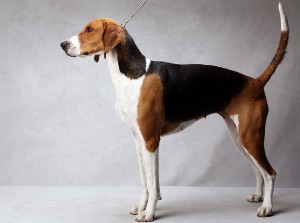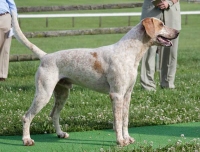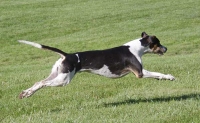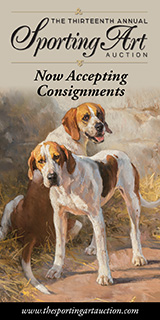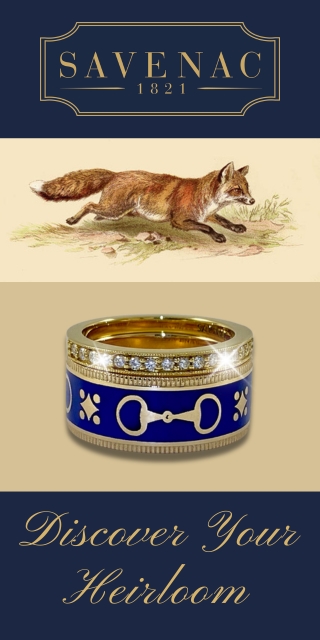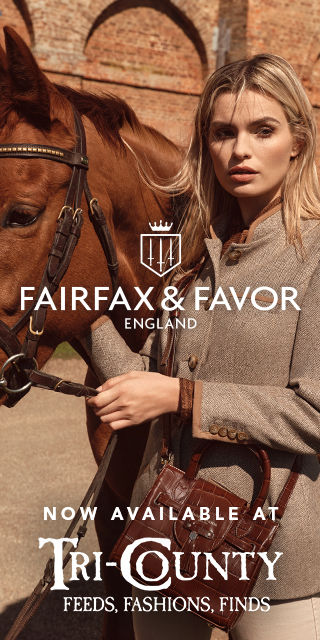American Foxhound
AKC English Foxhound Standard Needs Updating
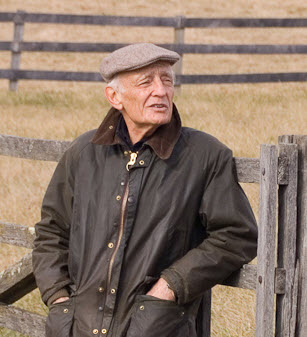 It’s a shame that there exists a disconnect between AKC foxhound standards and those of the foxhunting community. Not that foxhunters need be concerned with AKC foxhound standards. The Masters of Foxhounds Associations in this country and in England maintain their own breed registries, and both registries are orders of magnitude larger than the AKC foxhound registry.
It’s a shame that there exists a disconnect between AKC foxhound standards and those of the foxhunting community. Not that foxhunters need be concerned with AKC foxhound standards. The Masters of Foxhounds Associations in this country and in England maintain their own breed registries, and both registries are orders of magnitude larger than the AKC foxhound registry.
One would think, though, that the AKC should be more than a little interested in what foxhunters are breeding. After all, foxhunters are the ones using foxhounds for the purpose for which they were originally bred.
To look at the AKC standard for the English foxhound is to be stuck in a time warp of more than fifty years. According to a recent article by Ann Roth in DogChannel.com, the AKC breed standard for the English Foxhound was composed more than fifty years ago by foxhunters.
I’m not certain just which foxhunters the AKC was talking to fifty years ago, but I don’t believe the English foxhound photo accompanying Roth's article or the English foxhound painting found on the AKC website would have been models for any pack of that time, here or in England. They are more reminiscent of the so-called Shorthorn era in England, a period between the mid-nineteenth and the early twentieth centuries, when fashionable foxhounds of the time were criticized for resembling Shorthorn cattle.
American Foxhound Highly Regarded at Westminster
The smart money had the American foxhound and the affenpinscher dueling for top dog at Westminster last week. Jewel, the foxhound, won best of breed in the hound category, but, as everyone knows by now, it was the affenpinscher that was judged Best in Show. It’s often scary to see what AKC shows have done to some breeds, but I have to admit that Jewel, owned and handled by Lisa Miller, would look pretty nice in any pack of hounds I know.
Read More
New Zealand Huntsman Is Worthy Successor to David Wendler at West Hills
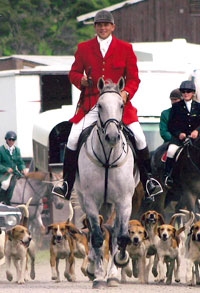
Huntsman Scott Neill
California’s West Hills foxhounds—organized sixty-three years ago by song-and-dance man Dan Dailey and boasting the late President Ronald Reagan as a founding member—were compelled to learn a new vocabulary disguised in a down under accent last season.
For the prior fifty-five years David Wendler, one of the most experienced huntsman ever to carry the horn, had led the West Hills Hounds over difficult and dry terrain, hunting a pack of independent-minded American hounds primarily of the July strain (with some Orange County red ring neck blood). When it came time for Wendler to retire, West Hills was in a quandary. How to keep up the high level of sport in what some believe to be the most demanding hunt country in North America?
Who Are those Red Ring-Necks?
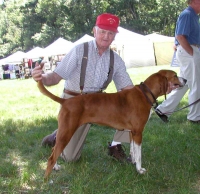 Anytime I see Melvin Poe, I always make a point to speak to him and show him his Florida strain of the Orange County red ring-neck foxhounds. He’s always so approachable and friendly and, of course, always interested in the red rings. In fact, last year at the Virginia Foxhound Show, I nearly missed one of our classes because I was talking to him just outside the ring. Luckily, Mac came running over and told me to get in there!
Anytime I see Melvin Poe, I always make a point to speak to him and show him his Florida strain of the Orange County red ring-neck foxhounds. He’s always so approachable and friendly and, of course, always interested in the red rings. In fact, last year at the Virginia Foxhound Show, I nearly missed one of our classes because I was talking to him just outside the ring. Luckily, Mac came running over and told me to get in there!
Our association with Orange County began in 1996, during our first season, when Kerry Glass, former Master and huntsman of the Norfolk Hunt (MA), contacted Melvin and arranged for us the draft of Orange County Boots, Bundles, and Britches. After our very first breeding to Boots, we instantly shifted our previously tri-color pack to red. Whenever we come to Virginia, we visit the Orange County kennels. It’s a ritual.
Myopia Gallant 2008 Is Grand Champion at New England
June 25, 2010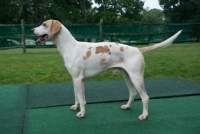 Myopia Gallant 2008, a handsome example of the modern English foxhound, dominated the flags at the New England Hound Show on June 13, 2010 to emerge Grand Champion. With Exmoor bloodlines on both sides of his pedigree and Heythrop blood in abundance on the male side, Gallant surely benefitted from the renowned breeding mastery of the late Captain Ronnie Wallace, who had brilliant tenures as Master and huntsman at both hunting establishments in the UK.
Myopia Gallant 2008, a handsome example of the modern English foxhound, dominated the flags at the New England Hound Show on June 13, 2010 to emerge Grand Champion. With Exmoor bloodlines on both sides of his pedigree and Heythrop blood in abundance on the male side, Gallant surely benefitted from the renowned breeding mastery of the late Captain Ronnie Wallace, who had brilliant tenures as Master and huntsman at both hunting establishments in the UK.
Old North Bridge Dandy 2002, a venerable brood bitch for that Concord, Massachusetts based hunt, was judged Champion American Foxhound. North Country Nacho 2004 traveled south from New Hampshire's and Vermont's Connecticut River Valley to capture the Crossbred Championship. And the Penn-Marydel Champion was Shakerag Valor 2007, a traditional black and tan hound full of Andrews Bridge bloodlines on the top side.
Blue Ridge Mortimer Is Grand Champion at Bryn Mawr
June 6, 2010
Blue Ridge Mortimer 2009 (Crawley and Horsham Morpeth 2005 ex Blue Ridge Crocus 2006) was judged Champion English Foxhound and ultimately Grand Champion of the Show at Bryn Mawr on Saturday, June 5. Mortimer goes back in tail-male to Marty and Daphne Wood’s renowned Live Oak Drummer 1989, but the bloodlines had to cross the Atlantic twice before winding up in the Blue Ridge kennels.
Live Oak Hounds Dominate at Virginia
Two hounds from the Live Oak kennels in Monticello, Florida, took top honors at the Virginia Foxhound Show on May 30, 2010 at Morven Park near Leesburg. English Foxhound Champion Live Oak Maximus 2009 (Live Oak Daniel 2007–Their Mistress 2006) was judged Grand Champion, and Crossbred Champion Live Oak Apache 2008 (Live Oak Mascot 2005–Their Apricot 2004) was named Reserve Grand Champion.


